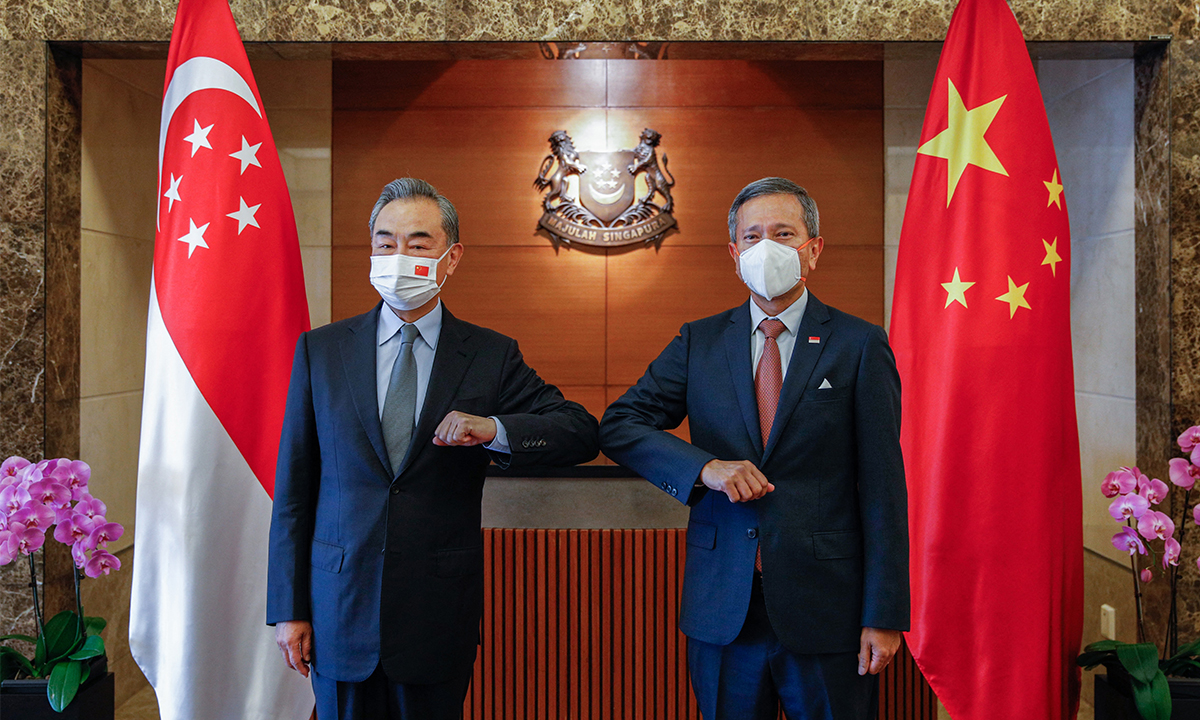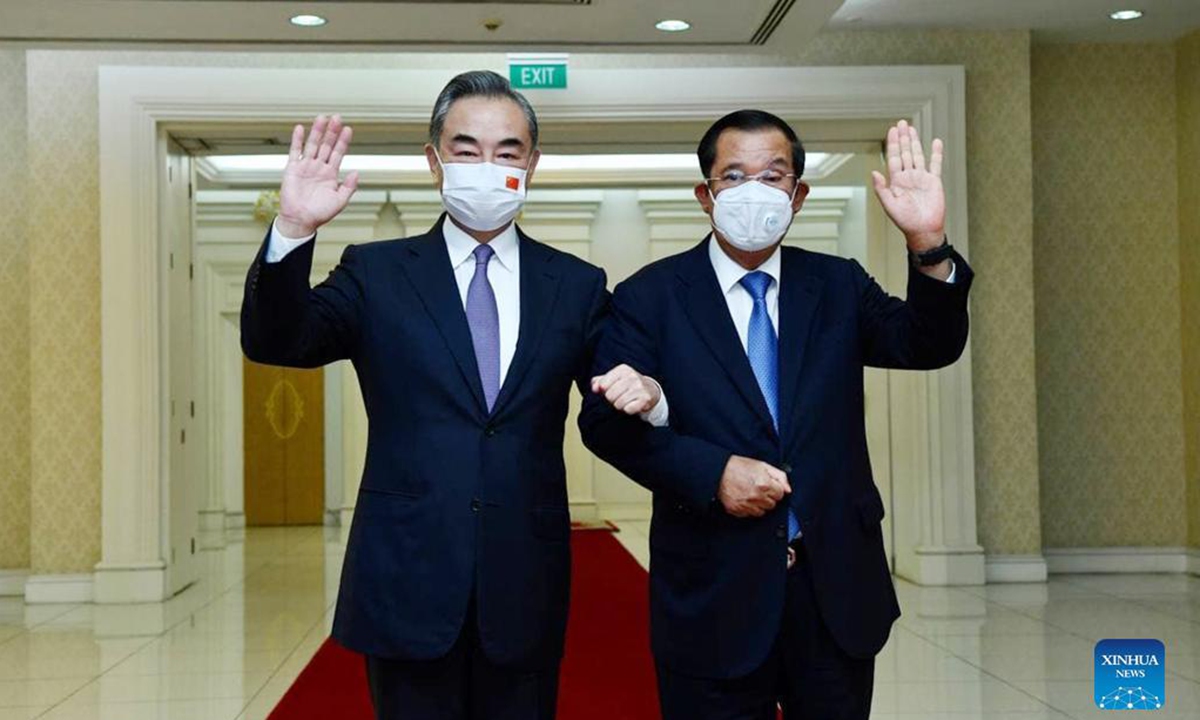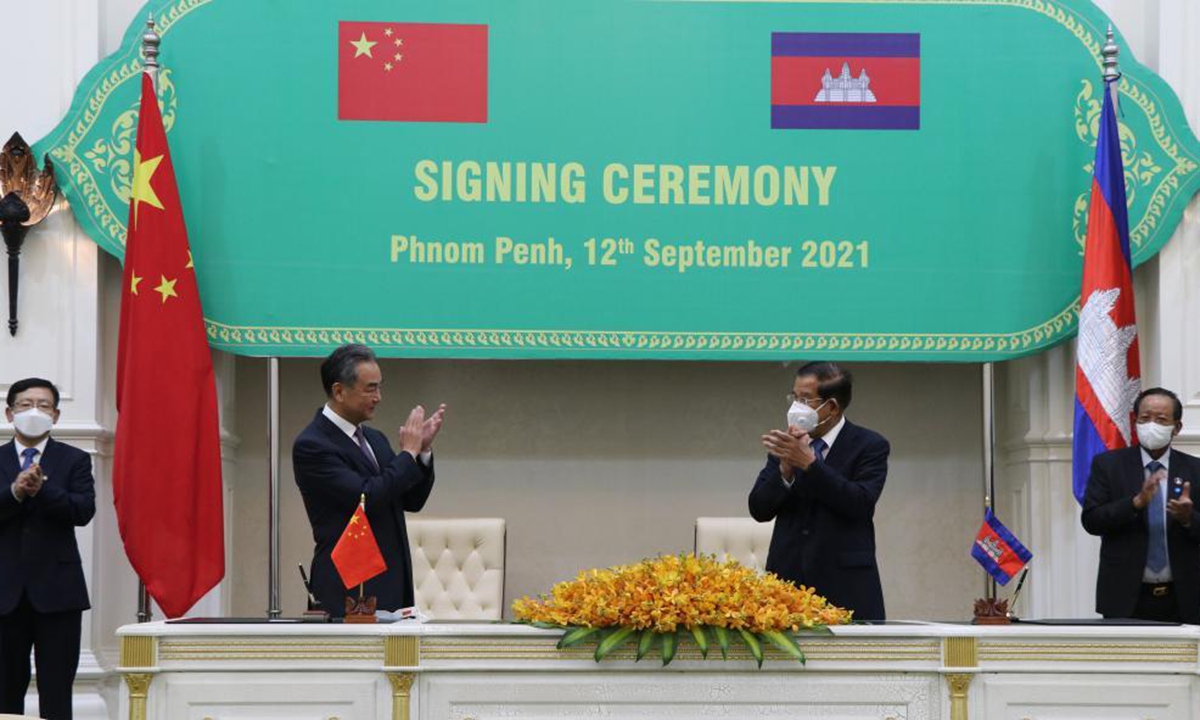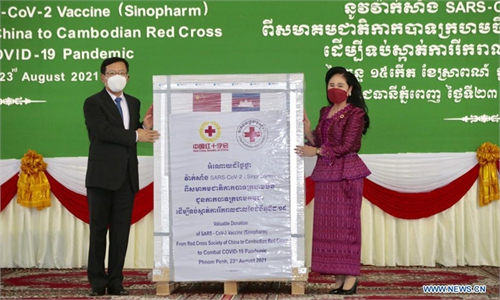
Chinese State Councilor and Foreign Minister Wang Yi (left) bumps elbows with Singaporean Foreign Minister Vivian Balakrishnan during Wang's visit to the country on Monday. Photo: AFP
Chinese State Councilor and Foreign Minister Wang Yi continued his week-long trip to four of China's neighboring countries, and after visits to Vietnam and Cambodia, Wang is said to visit Singapore from Monday to Tuesday and will end his trip in South Korea.
This diplomatic effort made by China to reinforce its connections with neighbors took place about a month after US Vice President Kamala Harris' visits to Singapore and Vietnam in August.
Chinese analysts said that US diplomatic activities around China are seeking cooperation from China's neighbors to contain China, to serve the US Indo-Pacific strategy. This is driven by the US strategic goal, rather than pragmatic economic development, which is much more important for countries in the region.
But China can always provide its neighbors something that the US failed to deliver, and China's diplomacy to neighboring countries is always driven by shared interests, common concerns and development, so the connectivity between China and its key neighbors is solid and reliable, and this is why Washington will fail at using China's neighbors to contain China, experts said.

Cambodian Prime Minister Samdech Techo Hun Sen (R) meets with visiting Chinese State Councilor and Foreign Minister Wang Yi in Phnom Penh, Cambodia, on Sept. 12, 2021. Photo:Xinhua
Cambodia, as a close neighbor to China and also benefits from China's development, has expressed its firm stance to treasure its friendship with China despite pressure from non-regional powers.
Although Cambodia is a small country, it will not succumb to pressure and will firmly support China on issues related to core benefits, Cambodian Prime Minister Hun Sen said in a meeting with Wang on Sunday, where Hun and Wang discussed further cooperation in fighting COVID-19 and other regional issues.
The Cambodian leader promised his country's firm support to China on issues concerning China's core interests, such as Taiwan, Hong Kong and Xinjiang, and said that Cambodia appreciates China's assistance in helping the country combat the COVID-19 outbreak.
Hun said Cambodia hopes to further cement bilateral cooperation on anti-epidemic measures, trade and economy, and infrastructure.
Wang responded that China will support Cambodia in defying international bullying and safeguarding national sovereignty and dignity. "China will be Cambodia's most reliable and long-term strategic partner."
Wang also promised that China will provide more COVID-19 vaccines and medical supplies to Cambodia to help the country contain the COVID-19 outbreak. In August, China donated additional 600,000 doses of the Sinopharm COVID-19 vaccine to Cambodia, giving the Southeast Asian country another boost to its immunization program.

Cambodian Prime Minister Samdech Techo Hun Sen (2nd R) and visiting Chinese State Councilor and Foreign Minister Wang Yi (2nd L) attend a signing ceremony of bilateral cooperation documents in Phnom Penh, Cambodia, on Sept. 12, 2021. Photo: Xinhua
Wang said earlier in a meeting with Cambodian Deputy Prime Minister and Foreign Minister Prak Sokhonn that the China-Cambodia relationship has weathered tests and difficulties and has become rock solid in the face of challenges. "The two countries have been jointly fighting power politics and bullying, safeguarding international fairness and justice, and the common interests of all developing countries," Wang said.
Li Haidong, a professor at the Institute of International Relations of the China Foreign Affairs University, told the Global Times that "China's policy in the neighboring regions is not driven by strategic competition with the US or other major powers, but driven by regional integration, inclusiveness, multilateralism, handling common challenges and realizing joint prosperity and development."
China's influence, image and credibility in the region are far greater and more positive than the US in terms of economic cooperation, which could effectively meet the local people's demand, Li said, adding that when the US pays efforts to demonize China and force others to choose side, it makes itself increasingly unpopular.
Wang also promised that China will continue to firmly support Cambodia in developing its economy, including increasing imports of Cambodian agricultural products, helping push forward Cambodia's industrialization and economic transformation.
When asked about the international counter-terrorism situation at a news conference after the meeting, Wang said that "20 years of practice after the 9/11 incident has proven that selective counter-terrorism linked to specific ethnic groups and religions will ultimately be self-defeating and will only promote discrimination and prejudice."
Cambodia is the second stop of Wang's week-long tour to four neighboring countries which Chinese experts said is significant in enhancing cooperation across economic and trade issues in addition to building political mutual trust and a shared vision of the security landscape across the region. Wang will be visiting Singapore and South Korea in the following days.
Wang on Monday met with Singaporean Deputy Prime Minister Heng Swee Keat and Foreign Affairs Minister Vivian Balakrishnan. At their meetings, the leaders noted the strong ties and cooperation between the two countries amid the pandemic, the Strait Times reported.
During Harris' visit to Singapore and Vietnam in August, the US made efforts to incite the problems between China and the two countries or demonize China's growing influence in the region to legitimize US presence. However, Vietnamese leaders said during Wang's trip to Hanoi that no one can undermine the unity and cooperation between the two countries, and highlighted the shared ideology of socialism of the two sides.
Singapore will show a similar response to China, said analysts, because staying neutral between China and the US is the key for the country to survive and keep playing the role of the "brains of ASEAN."
Jin Canrong, associate dean of the School of International Studies at the Renmin University of China, said that since Obama's term, the US has already started strengthening its ties with China's neighbors to contain China, but after so many years it received very limited outcomes, because "the US does not have enough money to buy other countries' loyalty. It can only use concepts of 'values' or 'security' to sell the fears and create mistrust worldwide. Now, everyone knows this and no one wants to be used and fooled again."




